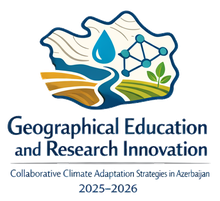Justus Liebig University Giessen (JLU), Germany
Department of Geography
JLU Giessen serves as the coordinating institution for the project. The Department of Geography leads curriculum co-development, provides expertise in participatory research methods, and facilitates academic exchange. The university supports joint workshops, research activities, and student mobility, ensuring a strong foundation in climate adaptation education and intercultural collaboration.
Institute of Geography, Ministry of Science and Education, Azerbaijan
As a central academic partner, the Institute of Geography contributes to curriculum modernization, coordinates field research, and ensures the integration of climate adaptation strategies into higher education structures. With a strong national role in educational development, the institute plays a key part in implementing and sustaining project outcomes within Azerbaijan’s academic landscape.
Faculty of Geography, Baku State University, Azerbaijan
This faculty plays a major role in embedding climate-related topics into geography education at the university level. It actively participates in curriculum enhancement, practical training, and the engagement of students in collaborative research. The faculty helps bridge scientific innovation with local environmental and educational contexts.
Azerbaijan Geographical Society (NGO)
As the project’s main non-academic stakeholder, the Azerbaijan Geographical Society supports community engagement and the integration of traditional knowledge into academic frameworks. The NGO acts as a bridge between academia, civil society, and local communities, contributing to the societal relevance and outreach of the project.
